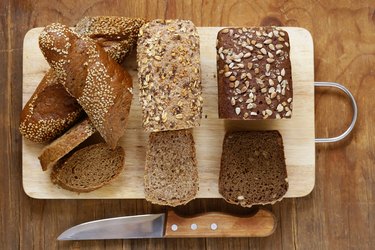
Starchy bread doesn't usually top the list of longevity-supporting foods. That's why you'll probably be surprised to learn that one type of loaf is linked to living a longer life: whole-grain sourdough.
Sourdough bread is the go-to for Greeks in Ikaria, one of the five Blue Zones, which are regions in the world with the longest lifespans.
Video of the Day
Video of the Day
Known for its signature sour taste (which is a product of the fermentation process) and crunchy texture, this popular Blue Zones bread boasts a bevy of benefits for healthy aging, including helping stabilize blood sugar and supporting gut health and weight management.
Here, Janice Padilla, a licensed dietitian who works with older adults, shares all the reasons why this fermented loaf is in a league of its own.
1. It Can Help Control Blood Sugar
Unlike other white bread varieties, sourdough won't spike your blood sugar. That's because, despite its carb content, sourdough is considered a low-glycemic food, Padilla says.
Here's why: The fermentation process creates organic acids (like lactic and acetate) that can delay starch absorption, Padilla says. And this increases insulin sensitivity, which can contribute to better glucose control, she explains.
That means that sourdough bread could be a delicious addition to your diet if you're living with diabetes. "Studies have shown many benefits of low glycemic index foods for overall health and metabolic conditions like diabetes," Padilla says.
Case in point: Enjoying whole-wheat sourdough bread daily is associated with a reduced risk of diabetes in southern Mediterranean populations, according to a November 2019 article in Aging Clinical and Experimental Research.
Considering diabetes can cause serious (potentially life-threatening) medical problems when left unchecked or unmanaged, it's crucial to do whatever you can — like swapping sourdough for white bread — to help control the condition for a longer, healthier life.
Tip
Though sourdough has a lower glycemic index, a June 2017 study in Cell Metabolism found that people’s glycemic response to it is highly variable. That means, depending on factors (including the make-up of your microbiome), you might still experience a blood sugar spike after eating sourdough. So, if you have a condition like diabetes, talk with your doctor or dietitian about whether eating sourdough regularly is OK.
2. It Promotes Gut Health
Sourdough bread is stellar for your gut.
While the probiotics (i.e., beneficial bacteria) produced during fermentation don't survive the high temperatures of baking, sourdough is still a solid source of prebiotics, Padilla says. Prebiotics serve as food for the good bugs in your gut microbiome, so they help your gut flora flourish and stay balanced.
The fermentation process also reduces the gluten content that may lead to gastrointestinal discomfort for those with gluten intolerance or sensitivity, Padilla adds.
What's more, the fiber content in whole-wheat sourdough can promote bowel movements, which is especially advantageous for aging adults as they're more likely to have constipation. Fiber is also associated with reduced inflammation, which plays a role in many chronic diseases, Padilla says.
All this to say, a happy gut (which is also linked to your immune system) might just lead to a longer, healthier life.
3. It’s Good for Your Heart
Snacking on sourdough can support heart health.
Here's how: By decreasing insulin resistance, eating sourdough bread may lower the response of triglycerides, and as a result, helps manage cholesterol levels, Padilla says. Having healthy cholesterol levels decreases your odds of developing heart disease.
Indeed, the November 2019 Aging Clinical and Experimental Research report also noted that Mediterranean people who made sourdough a staple in their diet also experienced a lower risk of coronary heart disease.
And, as we know, keeping your ticker in tip-top shape can help you age gracefully into your golden years.
4. It Helps You Absorb Nutrients
If you want to survive into your sunset years, you need to give your body all the nutrients it needs to function optimally. And eating sourdough bread, which helps you soak up massively important minerals, can help you do just that.
That's because the fermentation process reduces the amount of phytic acid available in the dough, Padilla says. Phytic acid — which is found naturally in plant foods — restricts the absorption of certain minerals. So, if you decrease phytic acid, you increase the availability of minerals like iron, calcium, potassium and zinc, Padilla explains.
5. It Supports Weight Management
While many weight-conscious people avoid bread because of the rich carb content, adding sourdough to your daily menu might actually help you manage the number on the scale.
Thanks in part to its low glycemic index, whole-wheat sourdough bread can contribute to losing excess weight, according to the November 2019 Aging Clinical and Experimental Research article.
The fiber content is also a fundamental factor in whole-wheat sourdough's benefits for weight loss and weight management, Padilla says. That's because fiber helps regulate blood sugar levels, which keeps you feeling fuller and keeps your hunger in check, per the Harvard T.H. Chan School of Public Health.
And maintaining a healthy weight can help you live longer. People with obesity have a greater risk for many serious health conditions including high blood pressure, high cholesterol, type 2 diabetes, coronary heart disease and stroke, all of which are associated with higher mortality rates, according to the Centers for Disease Control and Prevention.
- Aging Clinical and Experimental Research: “The Mediterranean way: why elderly people should eat wholewheat sourdough bread—a little known component of the Mediterranean diet and healthy food for elderly adults”
- Centers for Disease Control and Prevention: “Health Effects of Overweight and Obesity”
- Harvard T.H. Chan School of Public Health: “Fiber”
- Cell Metabolism: “Bread Affects Clinical Parameters and Induces Gut Microbiome-Associated Personal Glycemic Responses”


